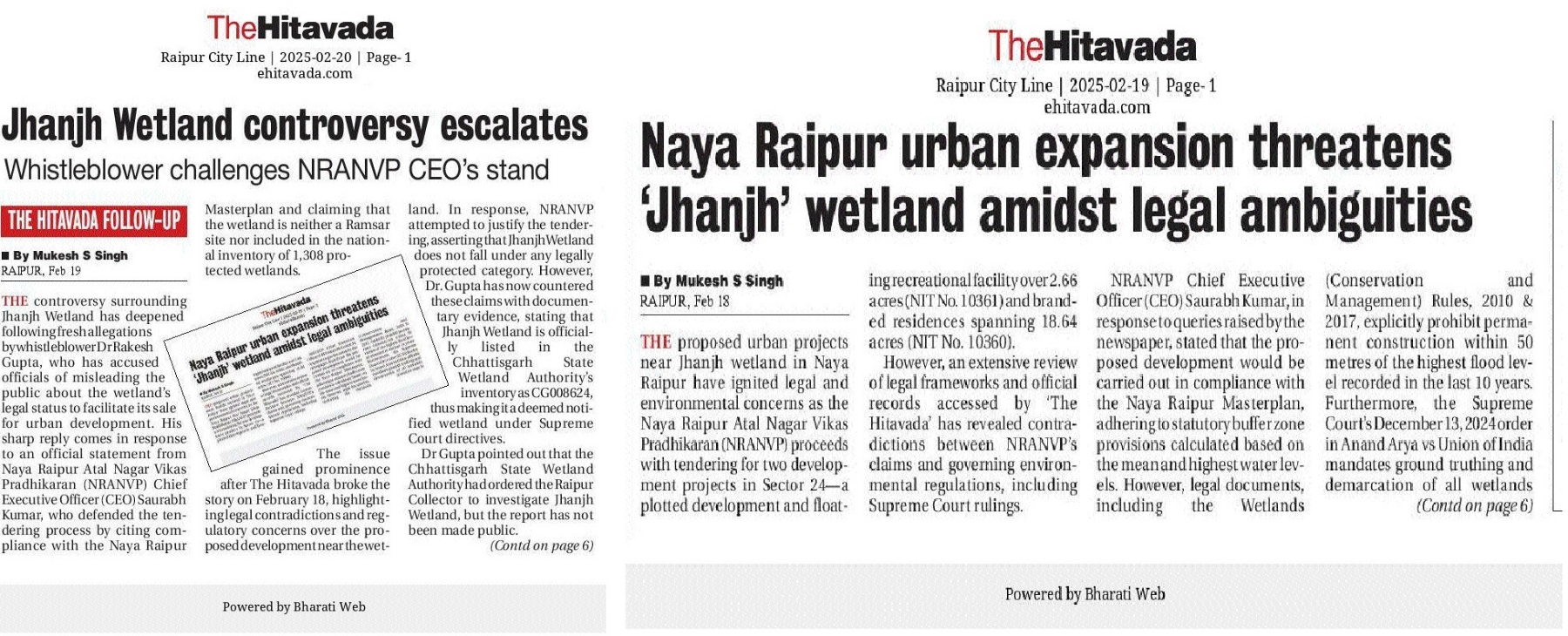CGSWA intervenes, directs NRANVP to withdraw Jhanjh Wetland tenders
| Date :04-Mar-2025 |

By Mukesh S Singh :
Raipur,
- Regulatory intervention follows scrutiny of procedural and statutory compliance in wetland conservation
- Official communication asserts that proposed projects contravene Supreme Court directives and environmental mandates
- NRANVP’s tendering process under legal review as contradictions in regulatory adherence emerge
The Chhattisgarh State Wetland Authority (CGSWA) has issued a formal directive to Naya Raipur Atal Nagar Vikas Pradhikaran (NRANVP), instructing the immediate withdrawal of tenders for two proposed real estate projects adjacent to Jhanjh Wetland, citing clear contraventions of Supreme Court orders and statutory environmental protections. The directive, formalised in a letter dated March 3rd, 2025, asserts that the tendering process is legally untenable and in direct breach of established wetland conservation frameworks.
The intervention follows intensive scrutiny initiated by The Hitavada through successive investigative reports, which meticulously exposed regulatory inconsistencies, procedural lapses, and the misrepresentation of Jhanjh Wetland’s legal status.
The newspaper’s sustained coverage compelled CGSWA to independently assess the matter, leading to its decisive intervention. The letter, addressed to NRANVP’s Chief Executive Officer (CEO), underscores that any continuation of the tendering process would be in violation of judicial mandates and would attract regulatory and legal consequences.
CGSWA’s directive pertains to NIT No. 10361, which proposes a plotted development and floating recreational facility over 2.66 acres, and NIT No. 10360, which outlines the construction of branded residences across 18.64 acres. The regulatory body affirms that these projects violate Rule 4(2)(iv) of the Wetlands (Conservation and Management) Rules, 2010 & 2017, which categorically prohibits permanent construction within 50 meters of the highest recorded flood level over the past decade.
Furthermore, the authority substantiates that Jhanjh Wetland qualifies as a “deemed notified wetland” under Supreme Court rulings, specifically referencing M.K. Balakrishnan vs Union of India (2017) and Anand Arya vs Union of India (2024). These judgments establish that wetlands exceeding 2.25 hectares, whether explicitly notified or not, fall under statutory protection and must remain safeguarded from encroachment or commercial development. This determination stands in stark contradiction to NRANVP’s prior assertion that Jhanjh Wetland was not legally classified as a protected ecological zone, thereby raising concerns over the procedural due diligence undertaken before initiating the tendering process.
Whistleblower Dr Rakesh Gupta, who has played a pivotal role in flagging these alleged regulatory violations, has welcomed CGSWA’s intervention while expressing concern over the delayed regulatory response despite clear statutory infringements.
“The directive unequivocally reinforces the Supreme Court’s standing orders on wetland conservation, which leave no discretionary space for such projects to proceed. The fact that these tenders were issued despite these provisions calls into question the adherence to regulatory diligence,” he remarked. He further raised concerns over the continued suppression of an inquiry report ordered by CGSWA, pointing out that on June 20th, 2023, the Raipur Collector was directed to submit a compliance report on encroachments within Jhanjh Wetland, yet the findings remain undisclosed. “If there were no violations, why is the report not being made public? If it contains adverse findings, does the withholding of this information indicate an attempt to obfuscate regulatory non-compliance?” Dr. Gupta questioned, asserting that transparency remains a key issue in the unfolding developments. CGSWA’s letter also reiterates that a Supreme Court-mandated nationwide wetland demarcation initiative remains in progress, requiring the scientific verification of all wetlands exceeding 2.25 hectares by March 13th, 2025. Despite this, NRANVP proceeded with the tendering process without awaiting the legally mandated verification, raising questions over procedural integrity and compliance with judicial directives.
Under the Environment (Protection) Act, 1986, violations of statutory wetland conservation laws entail significant legal repercussions, including penalties and imprisonment of up to five years for officials found responsible for authorising projects that result in ecological degradation. Furthermore, the Public Trust Doctrine, a Supreme Court-backed legal principle, stipulates that wetlands are preserved as ecological commons for public benefit and cannot be privatised or commercially exploited. “With CGSWA’s directive now legally enforceable, NRANVP’s actions will determine whether the regulatory framework is upheld or disregarded. The Supreme Court has provided absolute clarity on wetland conservation, and non-compliance with these mandates could have serious legal ramifications. The manner in which this case unfolds will test the integrity of environmental governance in Chhattisgarh,” Dr. Gupta stated in his concluding remarks.
